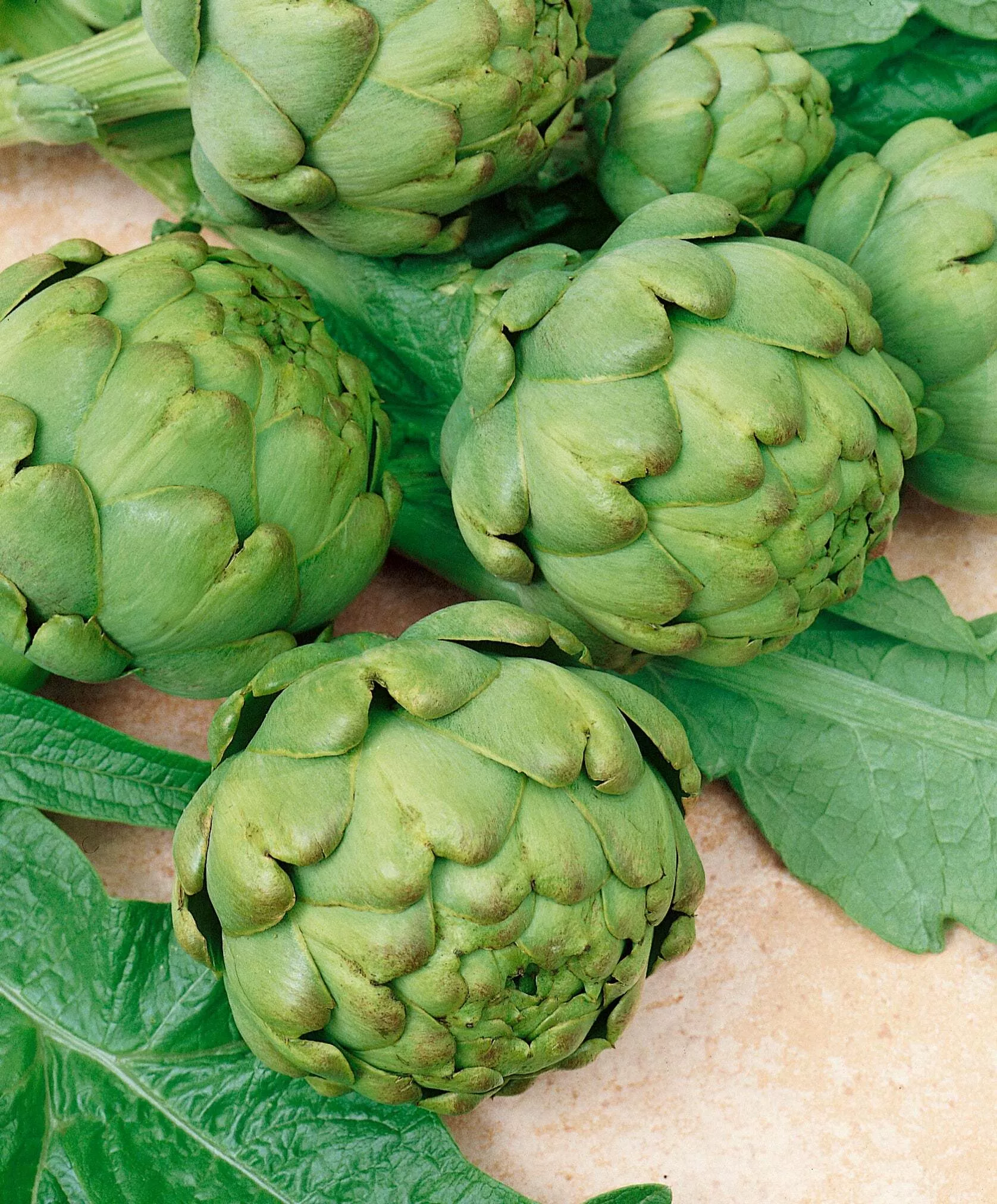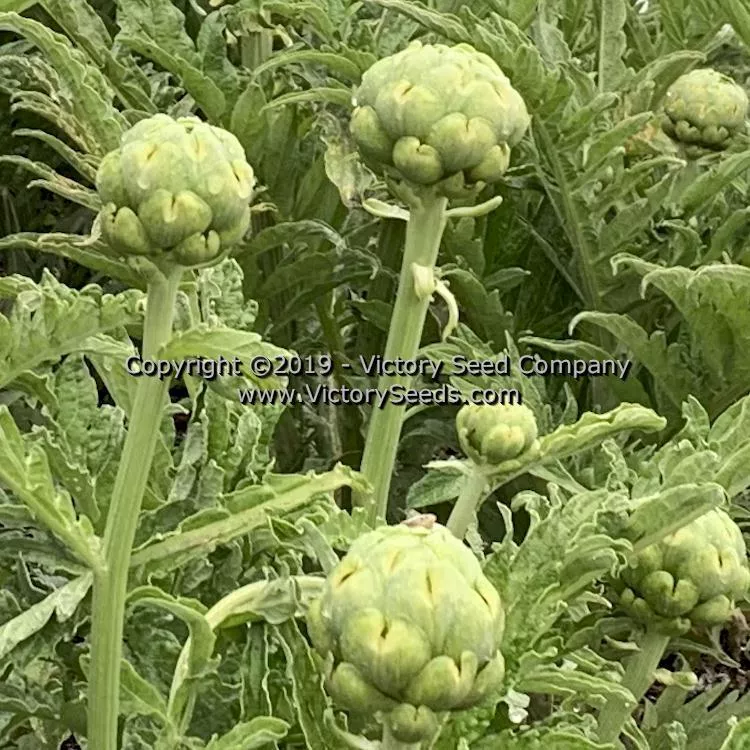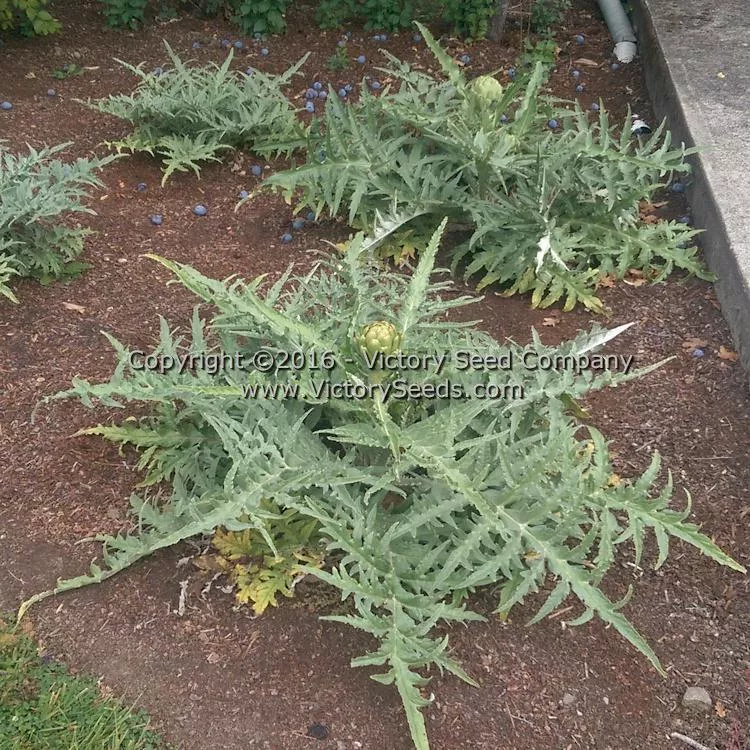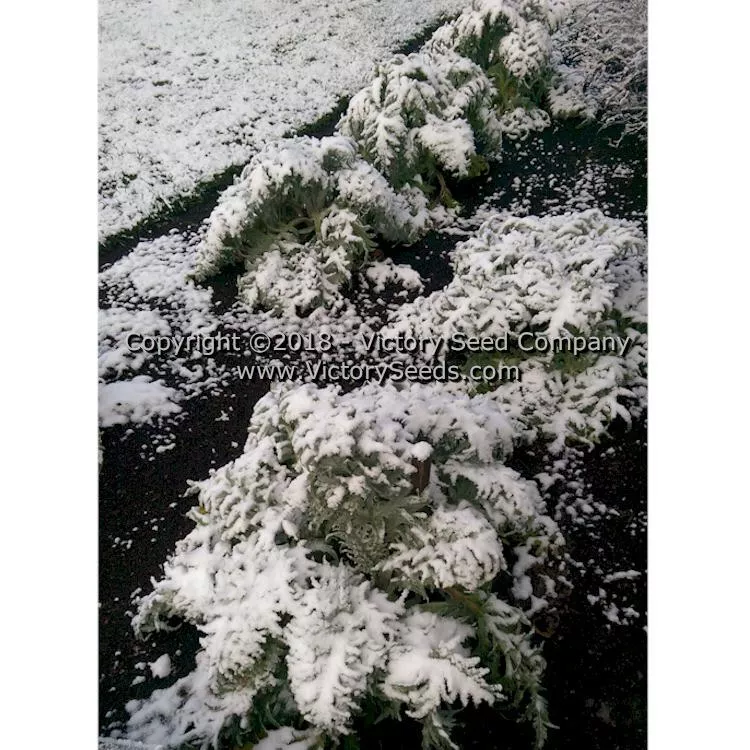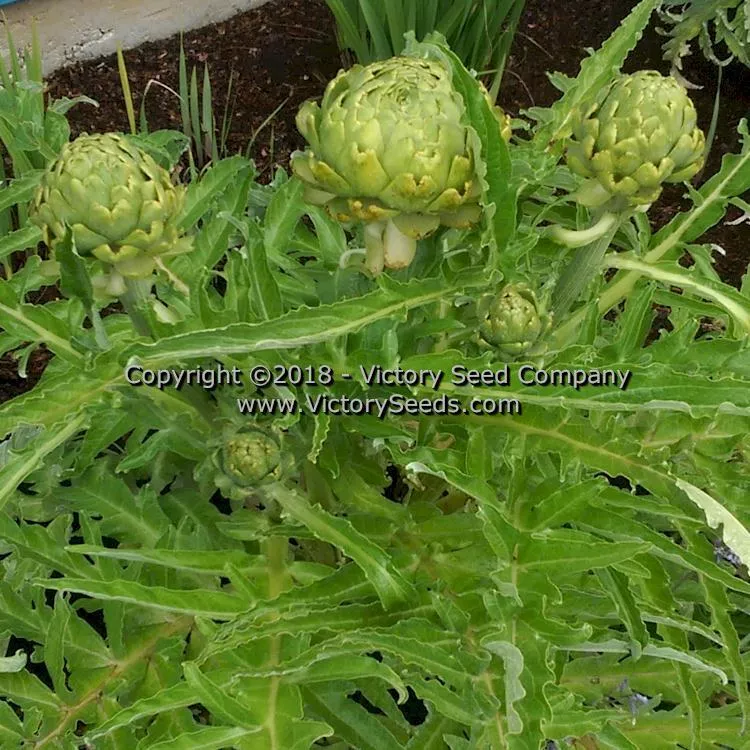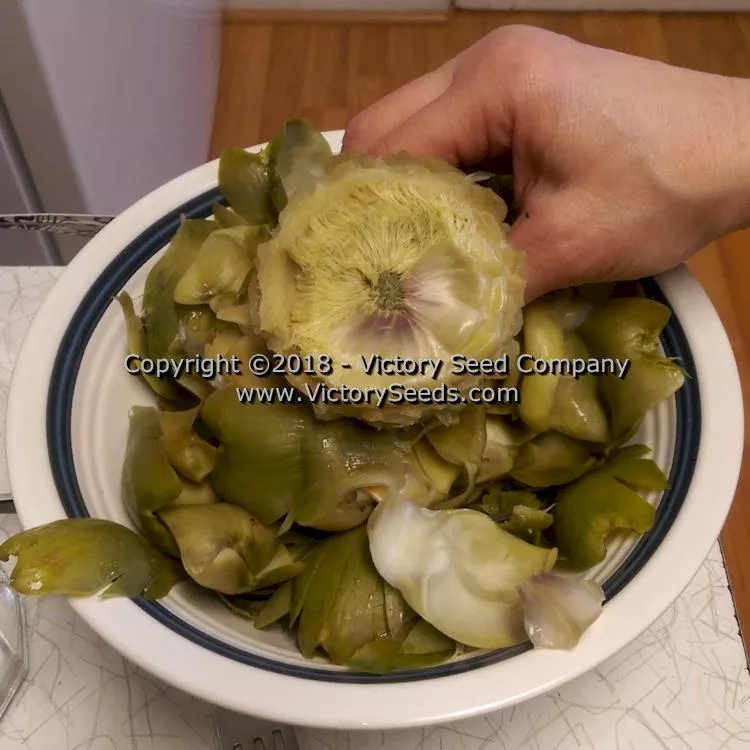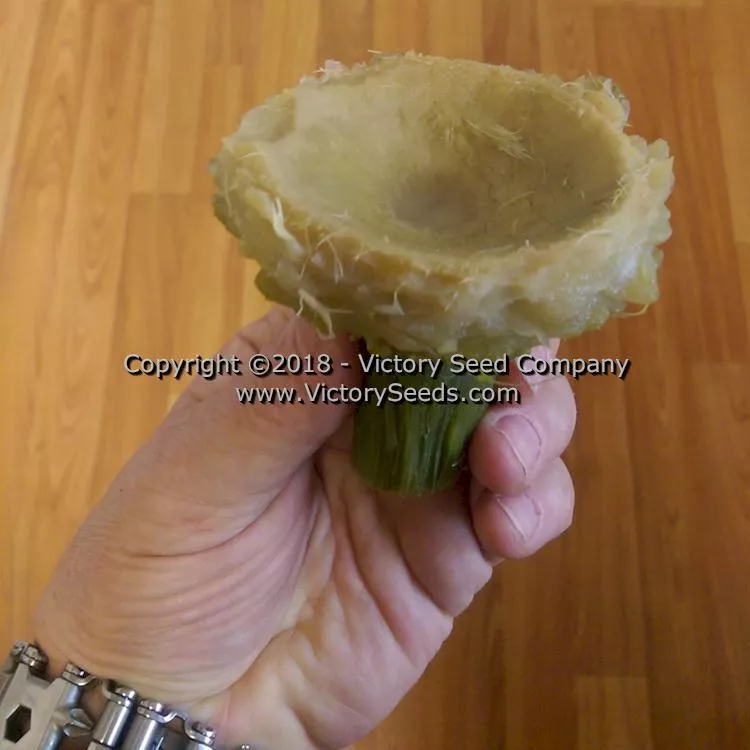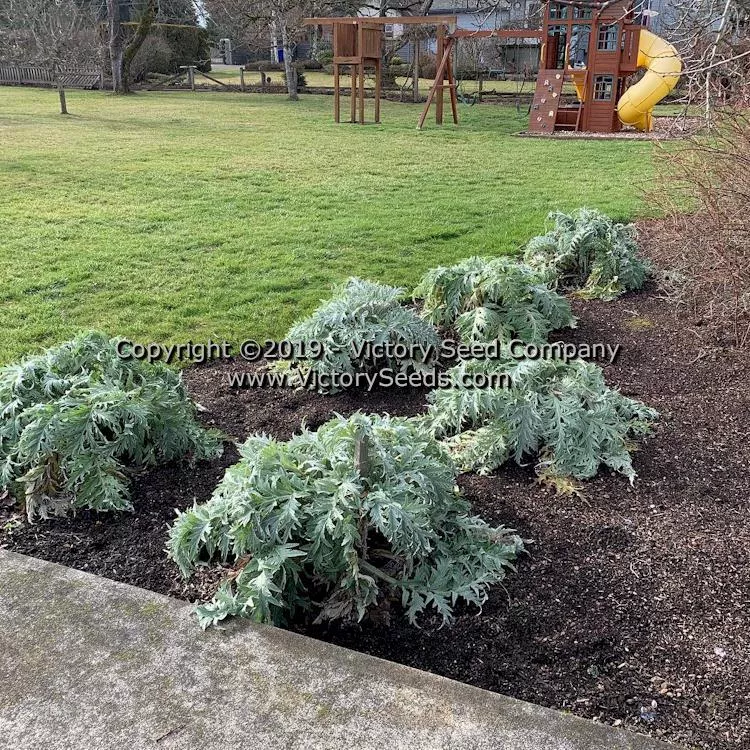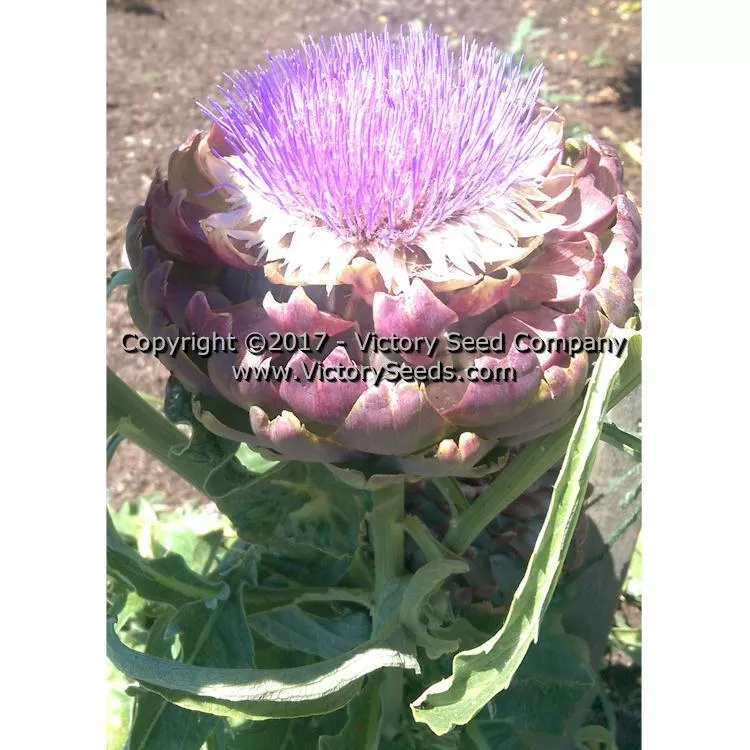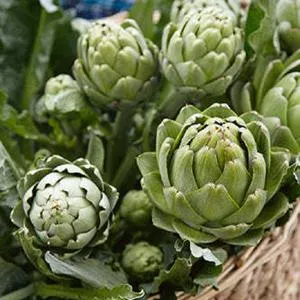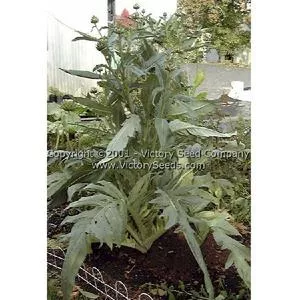









Imperial Star Artichoke
Cynara scolymus
Price: $3.95
SKU: 3010031217 days - 'Imperial Star' plants are compact, upright, and reach about fifty-seven inches at maturity. The first flower head is ready to harvest in about 217 days from seeding, with up to six secondary shoots that extend the harvest period to about fifty days. The flower heads are large (four to five inches in diameter), tight, spherical in shape, a waxy or glossy bright green color, with slight purple coloration near the bottom of the flowers. Unlike most common cultivars, 'Imperial Star' is thornless.
Artichoke flowers are an excellent delicacy when boiled or steamed until tender, served hot, and the inner petal tips and hearts dipped in melted lemon-butter (some of my family like to dip them in mayonnaise).
In general, artichokes are an interesting and attractive perennial with huge, edible flower buds and stalks. They can be grown as an annual if you sow the seeds indoors in mid to late winter and set out after all danger of frost has passed. In many parts of the world, they are grown as tender perennials. Although they are a perennial, the plants will require winter protection if you live in a zone that experiences severe freezing. Because the plants are interesting, attractive, and come back from year to year, artichokes make a great addition to your flowerbeds. Here in Oregon, we have had 'Imperial Star' freeze, thaw, and continue growing. Most years we allow them to go dormant, remove all of the above ground foliage, and heavily mulch the crowns to protect them during their winter nap. We typically average about six years out of the plants before we replace them.
Another example of classical breeding, years of time, and a lot of work, 'Imperial Star' was developed by Keith S. Mayberry and Wayne L. Schrader, farm advisors for the University of California Cooperative Extension Service in Imperial and San Diego counties, respectively. They started their selection work with F4 generation artichoke seed lines obtained in 1985 from Joe Principe, USDA breeder at the USDA's research field station in Brawley, California. The seeds from the Brawley Station began in 1981 with a cross of a 'Green Globe' selection that originated from France, with an individual plant from a thorny, Italian-type artichoke from Bari, Italy.
These seed lines formed the basis for mass crosses and selections which by the eighth generation, led to the distinctive bud characteristics, earliness, uniformity, and yield potential of the 'Imperial Star' cultivar. This open-pollinated variety is documented as being quite stable, with less than two percent of the plants exhibiting slightly flared, "pineapple bud shape," less than one percent having a slightly reddish hue, and approximately three-hundredths of one percent (3 in 10,000 plants) that produce spines on the flower heads or plants.
It was originally introduced, and PVP awarded in 1991. PVP expired in 2009. Hardy in USDA zones 8 to 10.
Historical Information: The exact origin of artichokes is unknown but they are presumed to have originated in North Africa where they still grow wild. They have been part of Mediterranean cuisines (Roman, Greek, etc.) since ancient times. Even today they remain an important winter vegetable there. Thomas Jefferson grew artichokes in his gardens and documented them off and on in his garden journals from 1770 until 1825.
Artichoke flowers are an excellent delicacy when boiled or steamed until tender, served hot, and the inner petal tips and hearts dipped in melted lemon-butter (some of my family like to dip them in mayonnaise).
In general, artichokes are an interesting and attractive perennial with huge, edible flower buds and stalks. They can be grown as an annual if you sow the seeds indoors in mid to late winter and set out after all danger of frost has passed. In many parts of the world, they are grown as tender perennials. Although they are a perennial, the plants will require winter protection if you live in a zone that experiences severe freezing. Because the plants are interesting, attractive, and come back from year to year, artichokes make a great addition to your flowerbeds. Here in Oregon, we have had 'Imperial Star' freeze, thaw, and continue growing. Most years we allow them to go dormant, remove all of the above ground foliage, and heavily mulch the crowns to protect them during their winter nap. We typically average about six years out of the plants before we replace them.
Another example of classical breeding, years of time, and a lot of work, 'Imperial Star' was developed by Keith S. Mayberry and Wayne L. Schrader, farm advisors for the University of California Cooperative Extension Service in Imperial and San Diego counties, respectively. They started their selection work with F4 generation artichoke seed lines obtained in 1985 from Joe Principe, USDA breeder at the USDA's research field station in Brawley, California. The seeds from the Brawley Station began in 1981 with a cross of a 'Green Globe' selection that originated from France, with an individual plant from a thorny, Italian-type artichoke from Bari, Italy.
These seed lines formed the basis for mass crosses and selections which by the eighth generation, led to the distinctive bud characteristics, earliness, uniformity, and yield potential of the 'Imperial Star' cultivar. This open-pollinated variety is documented as being quite stable, with less than two percent of the plants exhibiting slightly flared, "pineapple bud shape," less than one percent having a slightly reddish hue, and approximately three-hundredths of one percent (3 in 10,000 plants) that produce spines on the flower heads or plants.
It was originally introduced, and PVP awarded in 1991. PVP expired in 2009. Hardy in USDA zones 8 to 10.
Historical Information: The exact origin of artichokes is unknown but they are presumed to have originated in North Africa where they still grow wild. They have been part of Mediterranean cuisines (Roman, Greek, etc.) since ancient times. Even today they remain an important winter vegetable there. Thomas Jefferson grew artichokes in his gardens and documented them off and on in his garden journals from 1770 until 1825.
Genetic Classification: Open Pollinated
Planting Instructions:
Artichokes thrive in rich, well drained, deeply dug soil in full sun. A native of southern Europe, the plant will require winter protection if you live in a zone that experiences severe freezing. Hardy in USDA zones 8 to 10.
Start indoors 30 to 60 days before your last frost. Sow seeds ½ inch deep in sterile seed starting mix and keep moist until seedlings appear. Do not over water.
Space plants 24 inches apart in rows four feet apart. Keep uniformly moist and well fed. Since they are an attractive perennial plant, some folks use them as an ornamental in their flower beds.
The plants are compact, upright, and reach about fifty-seven inches at maturity. The first flower head is ready to harvest in about 217 days from seeding, with up to six secondary shoots that extend the harvest period to about fifty days. The flower heads are large, tight, spherical in shape, a waxy or glossy bright green color, with slight purple coloration near the bottom of the flowers. 'Imperial Star' is thornless.
Start indoors 30 to 60 days before your last frost. Sow seeds ½ inch deep in sterile seed starting mix and keep moist until seedlings appear. Do not over water.
Space plants 24 inches apart in rows four feet apart. Keep uniformly moist and well fed. Since they are an attractive perennial plant, some folks use them as an ornamental in their flower beds.
The plants are compact, upright, and reach about fifty-seven inches at maturity. The first flower head is ready to harvest in about 217 days from seeding, with up to six secondary shoots that extend the harvest period to about fifty days. The flower heads are large, tight, spherical in shape, a waxy or glossy bright green color, with slight purple coloration near the bottom of the flowers. 'Imperial Star' is thornless.
Informational Sources:
- "Application for Plant Variety Protection Certificate [9000179]," Regents of the University of California, Alameda, California, May 23, 1990.
Customer Reviews:
Do you have experience with this one? 📝 📣 Write a review!
★★★★★ Artichokes 1st year
By Stan (Kentucky) on December 12, 2024
By Stan (Kentucky) on December 12, 2024
All germinated. 5 of six are successfully started. It don't help when you step on one. Lol. The tallest made it to about 3 feet. No harvest this year but was not expected. I gave them no special care other than weeding and watering. I did mulch them for the winter. Hopefully we'll get a harvest next year.

